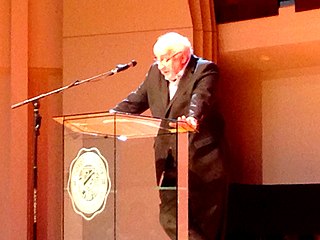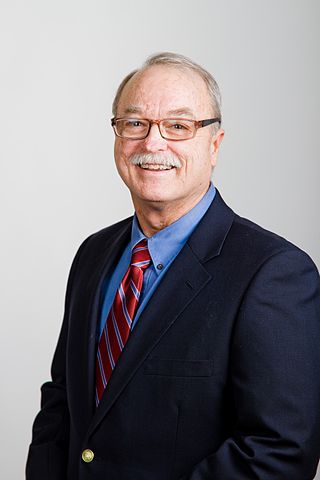Related Research Articles
Systematic theology, or systematics, is a discipline of Christian theology that formulates an orderly, rational, and coherent account of the doctrines of the Christian faith. It addresses issues such as what the Bible teaches about certain topics or what is true about God and His universe. It also builds on biblical disciplines, church history, as well as biblical and historical theology. Systematic theology shares its systematic tasks with other disciplines such as constructive theology, dogmatics, ethics, apologetics, and philosophy of religion.

Richard John Mouw is an American theologian and philosopher. He held the position of President at Fuller Theological Seminary for 20 years (1993–2013), and continues to hold the post of Professor of Faith and Public Life.

James Porter Moreland, better known as J. P. Moreland, is an American philosopher, theologian, and Christian apologist. He is a Distinguished Professor of Philosophy at Talbot School of Theology at Biola University in La Mirada, California.
Craig L. Blomberg is an American New Testament scholar. He is currently the Distinguished Professor Emeritus of the New Testament at Denver Seminary in Colorado where he has been since 1986. His area of academic expertise is the New Testament. This includes parables, miracles, historical Jesus, Luke-Acts, John, 1 Corinthians, James, the historical trustworthiness of Scripture, financial stewardship, gender roles, Latter Day Saint movement, hermeneutics, New Testament theology, and exegetical method. Blomberg has written and edited multiple books.
Donald Arthur Carson is an evangelical biblical scholar. He is a Distinguished Emeritus Professor of New Testament at Trinity Evangelical Divinity School and president and co-founder of the Gospel Coalition. He has written or edited about sixty books and served as president of the Evangelical Theological Society in 2022.
Douglas J. Moo is a Reformed New Testament scholar who, after teaching for more than twenty years at Trinity Evangelical Divinity School in Illinois, served as Blanchard Professor of New Testament at the Wheaton College Graduate School from 2000 until his retirement in 2023. He received his Ph.D. at the University of St. Andrews, in St. Andrews, Scotland.
Kevin Jon Vanhoozer is an American theologian and current research professor of Systematic Theology at Trinity Evangelical Divinity School (TEDS) in Deerfield, Illinois. Much of Vanhoozer's work focuses on systematic theology, hermeneutics, and postmodernism.
African theology is Christian theology from the perspective of the African cultural context. It should be distinguished from black theology, which originated from the American and South African context and is more closely aligned with liberation theology. Although there are ancient Christian traditions on the African continent, during the modern period Christianity in Africa was significantly influenced by western forms of Christianity brought about by European colonization.

Douglas R. Groothuis is an American Christian philosopher who is a professor of philosophy at Denver Seminary. Groothuis was a campus pastor for twelve years prior to obtaining a position as an associate professor of philosophy of religion and ethics at Denver Seminary in 1993. He was educated at the University of Wisconsin–Madison and the University of Oregon. He was married to Rebecca Merrill Groothuis until her death on July 6, 2018.
Tremper Longman III is an Old Testament scholar, theologian, professor and author of several books, including 2009 ECPA Christian Book Award winner Dictionary of the Old Testament: Wisdom, Poetry & Writings.
John H. Walton is an Old Testament scholar and Professor Emeritus at Wheaton College. He was a professor at Moody Bible Institute for 20 years. He specializes in the Ancient Near Eastern backgrounds of the Old Testament, especially Genesis and its creation account, as well as interpretation of Job.
Geoffrey William Bromiley was an English ecclesiastical historian and Anglican theologian. He was professor emeritus at Fuller Theological Seminary in Pasadena, California, having been Professor of Church History and Historical Theology there from 1958 until his retirement in 1987.
Craig S. Keener is an American Protestant theologian, Biblical scholar and professor of New Testament at Asbury Theological Seminary.
William A. Dyrness is an American theologian and professor of theology and culture at Fuller Theological Seminary. He teaches courses in theology, culture, and the arts, and is a founding member of the Brehm Center.
Gary M. Burge is an American author and professor. He is a New Testament scholar at Calvin Theological Seminary in Grand Rapids, Michigan. He is also an ordained minister in the Presbyterian Church (U.S.A.)

Antoine Kambanda is a Rwandan prelate of the Catholic Church who has been Archbishop of Kigali since 2019. He was Bishop of Kibungo from 2013 to 2018.
Jonathan Wilson-Hartgrove is a Christian writer and preacher who has graduated both from Eastern University and Duke Divinity School. He associates himself with New Monasticism. Immediately prior to the 2003 invasion of Iraq, he and his wife, Leah, were members of a Christian peacemaking team that traveled to Iraq to communicate their message to Iraqis that not all American Christians were in favour of the coming Iraq War. Wilson-Hartgrove wrote about this experience in his book To Baghdad and Beyond: How I Got Born Again in Babylon. Also in 2003, he became one of the co-founders of Rutba House, a Christian intentional community in Durham, North Carolina's Walltown Neighborhood. In 2006, he founded the School for Conversion, a popular education center committed to "making surprising friendships possible." He taught workshops there alongside his mentor and freedom teacher, Ann Atwater, until her death in 2016. Wilson-Hartgrove has also worked with the Rev. William J. Barber, II to promote public faith for the common good through Moral Mondays and the Poor People's Campaign: A National Call for Moral Revival.
World Christianity or global Christianity has been defined both as a term that attempts to convey the global nature of the Christian religion and an academic field of study that encompasses analysis of the histories, practices, and discourses of Christianity as a world religion and its various forms as they are found on the six continents. However, the term often focuses on "non-Western Christianity" which "comprises instances of Christian faith in 'the global South', in Asia, Africa, and Latin America." It also includes Indigenous or diasporic forms of Christianity in the Caribbean, South America, Western Europe, and North America.
Political theology in sub-Saharan Africa deals with the relationship of theology and politics born from and/or specific to the circumstances of the region. Arising from the anti-apartheid struggle in South Africa and nationalist campaigns of the mid- to late twentieth century elsewhere, the increasing numbers of Christians in sub-Saharan Africa has led to an increased interest in Christian responses to the region's continuing issues of poverty, violence, and war. According to the Cameroonian theologian and sociologist Jean-Marc Éla, African Christianity "has to be formulated from the struggles of our people, from their joys, from their pains, from their hopes and from their frustrations today." African theology is heavily influenced by liberation theology, global black theology, and postcolonial theology.
Ogbu Uke Kalu was a Nigerian theologian. He was known as a major figure in the study of African Christianity, especially with relationship to African Pentecostalism.
References
- 1 2 "Biography". Africa Matters: The Website of Fr. Emmanuel Katongole. Retrieved 28 November 2017.
- ↑ Katongole, Emmanuel (2009). Mirror to the Church: Resurrecting Faith After Genocide in Rwanda. Jonathan Wilson-Hartgrove. Downers Grove, IL: Zondervan. p. 14. ISBN 978-0-310-28489-5.
- ↑ "Emmanuel Katongole". Kroc Institute for International Peace Studies. Retrieved 28 November 2017.
- ↑ "Emmanuel Katongole". University of Notre Dame, Department of Theology. Retrieved 28 November 2017.
- ↑ "2017 Henry Martyn Lectures announced". Cambridge Centre for Christianity Worldwide. 5 October 2016. Retrieved 28 November 2017.
- ↑ "Christianity, Violence, and Belonging in Post-Colonial Africa". Cambridge Centre for Christianity Worldwide. 23 February 2017. Retrieved 28 November 2017.
- ↑ "Henry Luce III Fellows in Theology". Henry Luce Foundation. Archived from the original on 1 December 2017. Retrieved 28 November 2017.
- ↑ Flaherty, Kristi (29 March 2017). "Emmanuel Katongole named a Henry Luce III Fellow in Theology for 2017-2018". Kroc Institute for International Peace Studies. Retrieved 28 November 2017.